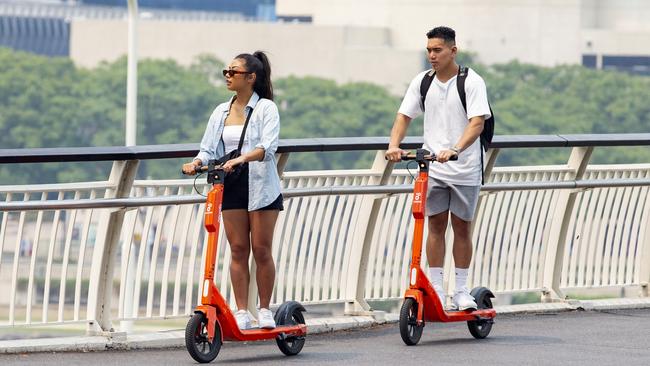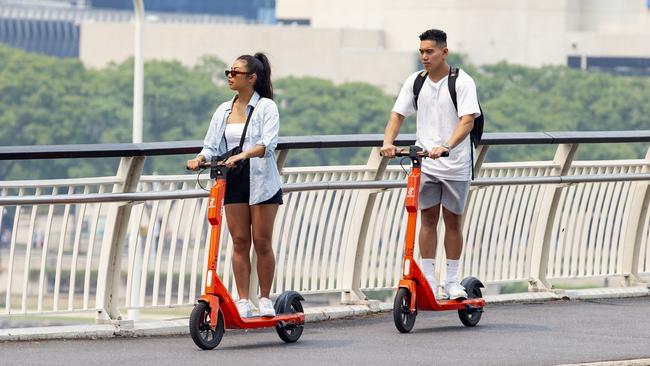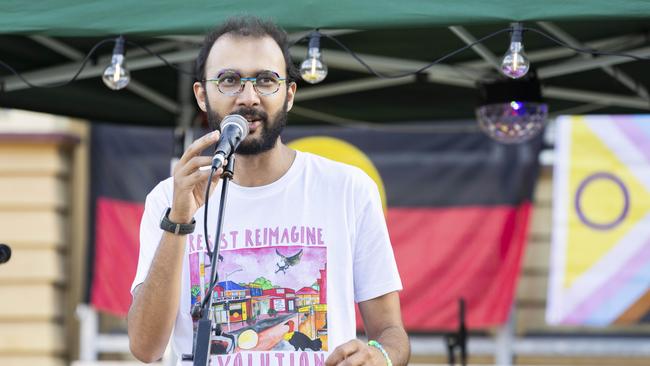Greens plan to give Brisbane residents a vote on banning hireable e-scooters
The Greens Lord Mayoral candidate has continued his flurry of controversial campaign announcements, this time floating the idea of allowing residents to vote on banning hireable e-scooters.

Southeast
Don't miss out on the headlines from Southeast. Followed categories will be added to My News.
The Greens Lord Mayoral candidate has continued his flurry of controversial campaign announcements, this time floating the idea of allowing residents to vote on banning hireable e-scooters.
Jonathan Sriranganathan said while there was a strong environmental argument in favour of using e-scooters rather than cars, their introduction had led to a surge in injuries.
He said every vision-impaired resident he had spoken to about them said they had been injured by carelessly dumped scooters.
The Metro North Hospital and Health Service, for example, recorded 952 e-scooter-related presentations at Royal Brisbane and Women’s Hospital, Princess Alexandra and Mater hospitals between November 2018 and June 2021.
It comes after Mr Sriranganathan announced a plan to redirect 1 per cent of the city’s rates revenue, or about $40 million per year, to any indigenous group which needed funding and free bus transport to indigenous communities for people stranded in the city.
Last week, he unveiled a policy to increase rates twentyfold on properties deliberately left vacant.
Mr Sriranganathan claimed the decision to allow Neuron and Lime to operate in Brisbane was done “behind closed doors’’ and a different outcome might have resulted if the public had been consulted.
He was proposing an online vote on whether they should be totally banned, restricted to certain parts of the city or other limitations imposed.
“Brisbane City Council should undertake a public referendum to determine whether operating licenses should be renewed or revoked for e-scooter hire companies,’’ he said.

“Rather than a simple yes or no vote, the public vote should also consider subsidiary questions such as whether hireable e-scooters should simply be banned from specific areas rather than from the entire city.’’
He said a vote could also include whether operating license fees should be increased and
whether higher fines should be enforced for e-scooters left in unsafe locations.
Mr Sriranganathan said the cost of holding a plebiscite, a common feature in democracies such as Sweden, would be modest if conducted digitally.
Paris residents recently voted on banning scooter. Only 7.5 per cent participated, but those who did overwhelmingly rejected the devices.
He said a vote should not be compulsory but expected it would generate a larger response.

“I think quite a lot of people who have strong views on the matter would be eager to have their say,’’ he said.
“Any conversation about the future of these devices needs to maintain some perspective and recognise that if we were genuinely concerned about safety and comfort of pedestrians, we would start by reducing inner-city speed limits for all motorised vehicles and installing more safe pedestrian crossings and traffic calming.
“Some people argue that e-scooters are a net environmental positive because they replace car trips.
“Other people point out that the hireable e-scooters which are mostly deployed in the inner-city are actually more likely to replace walking, pedal power or public transport and that very few people are using hireable e-scooters to commute daily from the outer ’burbs.’’
The Department of Transport and Main Roads sets the rules for e-scooter usage and operating framework for hire companies.





